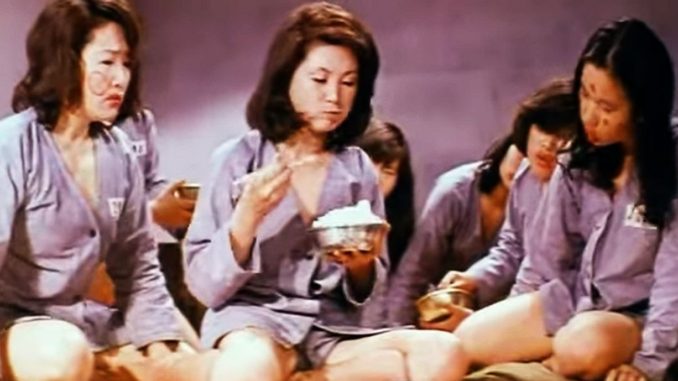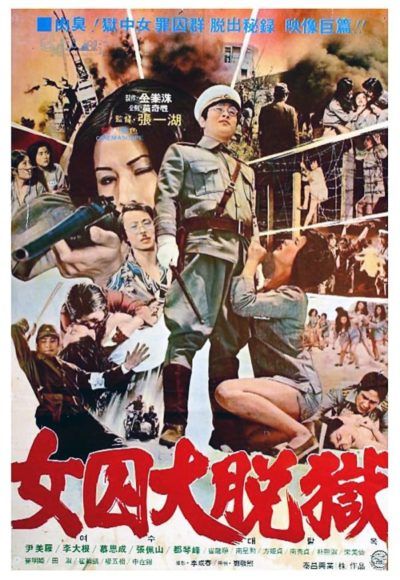
Rating: C
Dir: Il-Ho Jang and Chung Ting
Star: Mira Yoon, Fon Ting Ki, Dae-kun Lee, Szu-Cheng Mu
a.k.a. Excessive Torture In A Female Prison Camp
Despite a pair of intriguing if increasingly lurid titles, this is an entirely pedestrian production, long on mournful sobbing, melodrama and mouth-organ playing, while notably short on excessive torture. I guess Mild Unpleasantness in a Female Prison Camp would not have sold so well. It takes place during the Japanese occupation of China, in the penal facility initially run by Major Itoh, who looks like the keyboard player in a second-rate Japanese Sparks tribute band, He runs the place like his own personal holiday camp, occasionally bursting into song for no particular purpose, before engaging in a spot of sexual harassment of whatever new prisoners show up.
It’s very much an ensemble piece, with a lot of different stories being kicked around over the 80-minute running-time. The nearest thing we get to a heroine is likely Mu Yung (Yoon). She’s sentenced to jail for clubbing a Japanese officer to death with a rock, and then refusing to give the location of the guerillas – one of whom is her husband, Wang Ju – who are fighting the occupying army. Her mother and sister, Mai Ling, are also sent to prison for helping the Chinese resistance, but the latter manages to catch the eye of Itoh, which means she gets “special treatment,” bringing the suspicion of the other inmates, particularly the ones who are digging a tunnel – no vaulting horses are involved in this project, despite the movie’s title. It doesn’t end well: cue more mournful sobbing.
 Itoh is subsequently replaced as warden by Lt. Fung Kau, a Chinese collaborator who knows Yung and Mai Ling,. He still carries a flame for the former, and a grudge, because Yung picked Wang over him. Really, for a women-in-prison film, it’s remarkably soapy, especially after he strangles Yung’s mother in a fit of rage and manic laughter. His brother, Pao, ahows up to try and convince the warden about the error of his traitorous ways. That doesn’t end well either. Yung tries to escape while on a work detail: hardly “great”, since it’s just her. She’s recaptured and when she continues to spurn Fung, she’s sentenced to death, only for Wang and the rest of the Chinese resistance to storm the prison at the last moment and break everyone out.
Itoh is subsequently replaced as warden by Lt. Fung Kau, a Chinese collaborator who knows Yung and Mai Ling,. He still carries a flame for the former, and a grudge, because Yung picked Wang over him. Really, for a women-in-prison film, it’s remarkably soapy, especially after he strangles Yung’s mother in a fit of rage and manic laughter. His brother, Pao, ahows up to try and convince the warden about the error of his traitorous ways. That doesn’t end well either. Yung tries to escape while on a work detail: hardly “great”, since it’s just her. She’s recaptured and when she continues to spurn Fung, she’s sentenced to death, only for Wang and the rest of the Chinese resistance to storm the prison at the last moment and break everyone out.
Once more: there’s definitely a lack of torture which I would call “excessive”. The only imaginative moment sees the tunnel escapees blindfolded and made to to walk a high beam over wooden spikes. Otherwise, it’s limited to slapping around, and even there, the victims seem to have been stitched into their clothes. It feels as if the directors had never actually seen a women-in-prison movie before, and were unclear on the concepts, beyond it involving “women” and “prison”. For something made in the seventies, it feels considerably older. If achieving an adequate standard of competence, it should not be at all hard to find a better use of your viewing time.
